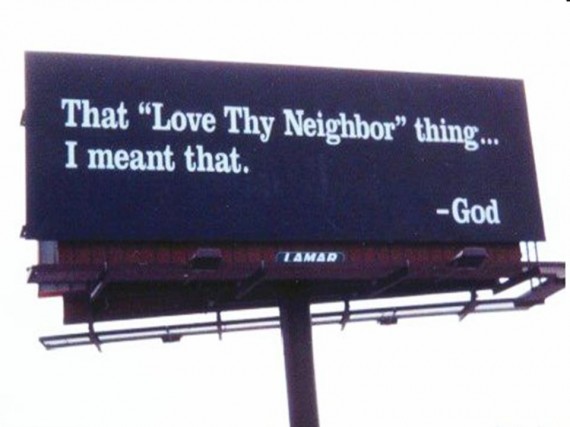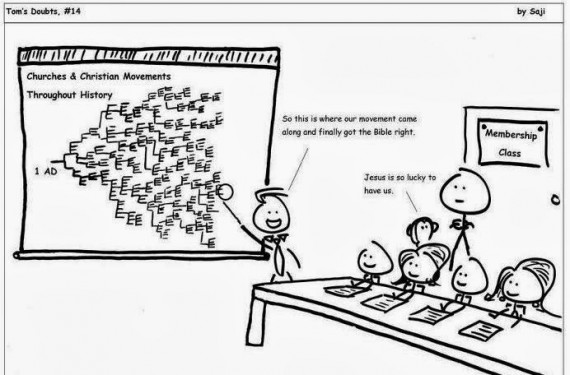Lots of people these days are looking for an online Bible college or seminary where they can take courses from home without having to leave their jobs and uproot their families and move to a new city or state. Thankfully, more and more schools are offering online Bible college courses and online seminary classes to meet this rising need.

This post contains what I consider to be the 10 Best Online Bible Colleges and Seminaries. Some of them even offer free online Bible college courses!
Of course, you won’t get actual college credit for taking these free courses, but at least you can get the information. Most of the people I talk to who are interested in taking online Bible college courses are not too concerned about the credit, but simply want the information that an online Bible college or seminary can offer.
So whether you are interested in getting an online Bible college degree, or if you just want to get the information that an online Bible college offers, check out the list of schools near the end of this post.
Online Courses with N.T. Wright
Before you spend a lot of time and money applying and enrolling to one of the online Bible Colleges or seminaries below, you might want to take a few courses first to see if online Bible college is for you. I highly recommend you first take some of the online Bible college courses from leading New Testament Scholar, N. T. Wright.
 These courses are much cheaper than what you will pay at another online Bible College or Seminary ($600-$900 per course), plus you can complete them on your own time and at your own pace.
These courses are much cheaper than what you will pay at another online Bible College or Seminary ($600-$900 per course), plus you can complete them on your own time and at your own pace.
I recommend you start with N. T. Wright’s course on Galatians, but he has others there as well (such an online course on the Gospel and another on Philippians).
If you take one of these courses from N. T. Wright and you enjoy the online learning experience, then you should consider applying and enrolling into one of the online Bible colleges and seminaries below.
Online Bible Colleges and Seminaries I Recommend
 I have actually attended four of these online Bible colleges, and have taken classes from them. The others I have heard good things about from friends and family members who have attended them.
I have actually attended four of these online Bible colleges, and have taken classes from them. The others I have heard good things about from friends and family members who have attended them.
If you are curious about whether an online Bible college course is equivalent to an in-person Bible college course, I will have a few things to say about this at the end of this post.
- Moody Bible Institute Online – I got my Bachelor’s from Moody, and highly recommend this online Bible seminary. They probably have online Bible college courses as well if you look around their site for them.
- Dallas Theological Seminary – I received my Masters of Theology from DTS. I took many of their courses online, and can vouch for the quality of these classes.
- Biblical Education by Extension – I actually used to teach classes for BEE World. I haven’t done so in a few years, but might want to try to get back into it sometime in the future. One great thing about BEE World is that they specialize in offering online Bible college level courses around the world to people in other countries.
- Rocky Mountain Bible College and Seminary – I strongly recommend this online Bible college and seminary. Though this school is relatively small, I am a strong supporter of their theology, even more-so than what is taught at Moody Bible Institute and Dallas Theological Seminary. The president, Dr. Stephen R. Lewis, is a friend of mine.
- Grace School of Theology – I almost attended here instead of Dallas Theological Seminary. At the time, however, they were not accredited, and so Dallas won out. But I believe they are accredited now, and they offer some great online Bible college courses.
- Tyndale Theological Seminary – This is another great online Bible seminary, and when I was in Dallas, I knew several students who were getting top-notch education at Tyndale. The cool thing about Tyndale is that you can take their courses for FREE if you don’t want credit for them.
- Biola University – Half of my family went to this college, and it looks like they offer online Bible college courses.
- Talbot Seminary – Talbot is the Seminary of Biola University. I don’t actually know if they offer online Bible courses, but you can check them out anyway.
- Baptist Bible College and Seminary – I am not Baptist, but this seems to be a quality school, and they offer online Bible college courses at both the undergraduate and graduate level.
- Biblical Seminary – I love the emphasis Biblical Seminary places on missional living and missional theology. In my opinion, they are one of the leading seminaries in the country for missional studies.
If you know of other good quality online Bible colleges and seminaries, let me know in the comments below.
Are Online Bible Colleges any Good?
I have taken many online Bible college courses, and have taught a few myself. In my opinion, modern technology has allowed online Bible college courses to be just as good as real-world, in-person Bible college courses.
Often you can chat live with other students and the professor. Frequently you can watch the video of the professor teaching the course. At the bare minimum, there is always audio which you can listen to and email to ask questions. Most often there is also some sort of online forum in which you can interact with the professor and other students.
 The great benefit to online Bible College courses is that you can “attend class” when it is convenient for you. Though I was actually living in Dallas when I attended Dallas Theological Seminary, I always took at least one course online each semester. This means less time away from home and I could “sit in class” at 1 or 2 in the morning if necessary.
The great benefit to online Bible College courses is that you can “attend class” when it is convenient for you. Though I was actually living in Dallas when I attended Dallas Theological Seminary, I always took at least one course online each semester. This means less time away from home and I could “sit in class” at 1 or 2 in the morning if necessary.
Another thing I liked about the online classes is that they often provided a transcript of what the professor said in the video. I downloaded every transcript of every class I took online and still have them stored on my computer. This is an invaluable resource.
The only downside to taking online Bible college course is that you may not get to personally meet other students and the class professors. But since you don’t have to move or uproot your family to attend Bible college or seminary, going the online Bible college route makes it worth it. If possible, maybe you could even find a few other people in town who will want to take the class together, and then you can all meet and talk about what you are learning in the online Bible college course.
Have you ever taken online Bible college or seminary courses? What was your experience? Do you have any other questions or comments about online Bible college courses? Let me know!




 Of course, do we Christians really believe that Jesus was right? It often seems that we do not. We often seem so intent on believing the right things, and knowing the right things, and doing the right things, and forcing other people to believe, know, and do the right things also, that we neglect to actually show love.
Of course, do we Christians really believe that Jesus was right? It often seems that we do not. We often seem so intent on believing the right things, and knowing the right things, and doing the right things, and forcing other people to believe, know, and do the right things also, that we neglect to actually show love.
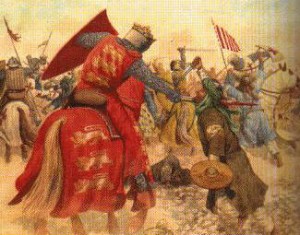 The Christian crusades of the Middle Ages were one of the greatest evils ever carried on in the history of the world. Oh, I know, I know. It was nothing compared to the holocaust, right? The crusades were just wars where one country was trying to get land from another country, right?
The Christian crusades of the Middle Ages were one of the greatest evils ever carried on in the history of the world. Oh, I know, I know. It was nothing compared to the holocaust, right? The crusades were just wars where one country was trying to get land from another country, right? I read one person who said, “They’re gay and under the curse of God!” WHAT? Even if that were true (it isn’t), that gives you the right to kill them? Such an idea is Satanic.
I read one person who said, “They’re gay and under the curse of God!” WHAT? Even if that were true (it isn’t), that gives you the right to kill them? Such an idea is Satanic.
 Yesterday I needed to pick up a couple of things at Costco. Since I had a little extra time, I visited all of the free food sample tables. I even tried a few of the samples, but mostly I talked to the people working the sample tables.
Yesterday I needed to pick up a couple of things at Costco. Since I had a little extra time, I visited all of the free food sample tables. I even tried a few of the samples, but mostly I talked to the people working the sample tables. Standing near the door where he entered, I greeted him. He said “God bless you.” Homeless people frequently tell me that, so I didn’t think much about it. I headed to the kitchen where I was preparing ice cream for the break, and the homeless man appeared to be heading for the door.
Standing near the door where he entered, I greeted him. He said “God bless you.” Homeless people frequently tell me that, so I didn’t think much about it. I headed to the kitchen where I was preparing ice cream for the break, and the homeless man appeared to be heading for the door.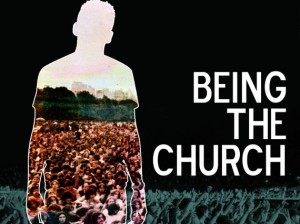 Want to be the church in your community but don't know? Here are some posts which not only explain what it means to be the church in your community, but also gives concrete, practical examples of what it looks like and how to be the church whatever you do and wherever you go.
Remember, you ARE the church, and wherever you go, Jesus goes with you!
Want to be the church in your community but don't know? Here are some posts which not only explain what it means to be the church in your community, but also gives concrete, practical examples of what it looks like and how to be the church whatever you do and wherever you go.
Remember, you ARE the church, and wherever you go, Jesus goes with you!



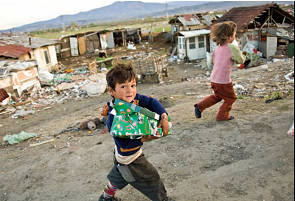 Children all over the world are hurting and broken through no fault of their own. Many have lost all they had in a hurricane, earthquake, or tsunami. Others have gone through a war that ransacked their village and took the lives of their family, often leaving them orphans. Still other children have endured torture at the hands of slave owners, or have witnessed torture at the hands of enemies.
Children all over the world are hurting and broken through no fault of their own. Many have lost all they had in a hurricane, earthquake, or tsunami. Others have gone through a war that ransacked their village and took the lives of their family, often leaving them orphans. Still other children have endured torture at the hands of slave owners, or have witnessed torture at the hands of enemies.


 Life is hard.
Life is hard.
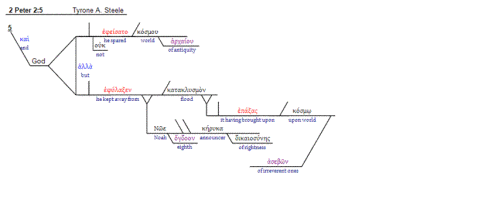 And in fact, this would be somewhat easy to do, since these first several verses of 2 Peter 2 are full of Greek participles, which are notoriously difficult to translate and understand in context. With Greek participles, there are always a host of questions about how the participle is functioning in context.
And in fact, this would be somewhat easy to do, since these first several verses of 2 Peter 2 are full of Greek participles, which are notoriously difficult to translate and understand in context. With Greek participles, there are always a host of questions about how the participle is functioning in context. In the following verses, God is often implied to be the agent of destruction—as the one who brought the destruction, as the one who carried it out. But as 2 Peter 2:1 indicates, the reason for the destruction is quite clear: the false teachers bring this destruction upon themselves. They are the ones who brought it. They are ones to blame (2 Peter 2:1-3).
In the following verses, God is often implied to be the agent of destruction—as the one who brought the destruction, as the one who carried it out. But as 2 Peter 2:1 indicates, the reason for the destruction is quite clear: the false teachers bring this destruction upon themselves. They are the ones who brought it. They are ones to blame (2 Peter 2:1-3).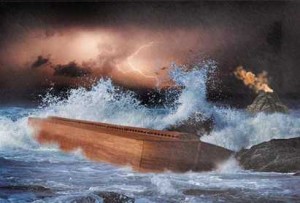 So it was in the case of the flood. When Peter writes in 2 Peter 2:5 that the flood was brought upon the people at the time of Noah, Peter uses the exact same word he uses in 2:1 to write about how the false teachers brought destruction upon themselves (Gk., epagō, “to bring upon”). The flood was brought upon the people in the days of Noah in the same way that destruction is brought upon false teachers, and chains of darkness were brought upon angels who sinned, and fire and brimstone was brought upon Sodom and Gomorrah.
So it was in the case of the flood. When Peter writes in 2 Peter 2:5 that the flood was brought upon the people at the time of Noah, Peter uses the exact same word he uses in 2:1 to write about how the false teachers brought destruction upon themselves (Gk., epagō, “to bring upon”). The flood was brought upon the people in the days of Noah in the same way that destruction is brought upon false teachers, and chains of darkness were brought upon angels who sinned, and fire and brimstone was brought upon Sodom and Gomorrah.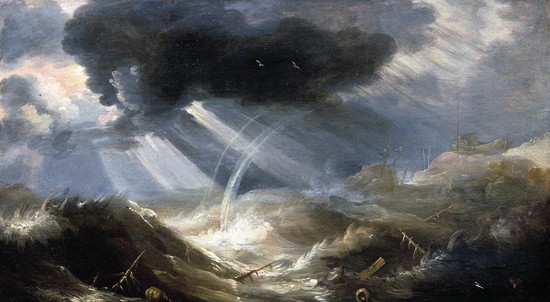
 How can a God who says "Love your enemies" (Matthew 5:44) be the same God who instructs His people in the Old Testament to kill their enemies?
How can a God who says "Love your enemies" (Matthew 5:44) be the same God who instructs His people in the Old Testament to kill their enemies?

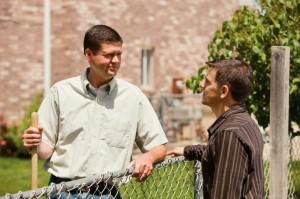 Should the church proclaim the Gospel to the community? Does the church need to teach the Bible and even correct theology to the community? Are sermons and Bible studies the best way to do these things? Are they the only ways to proclaim the gospel?
Should the church proclaim the Gospel to the community? Does the church need to teach the Bible and even correct theology to the community? Are sermons and Bible studies the best way to do these things? Are they the only ways to proclaim the gospel?